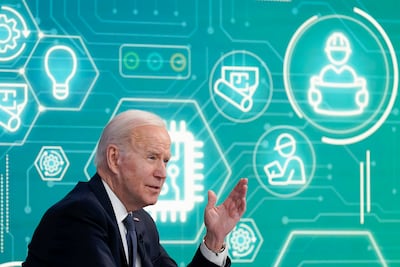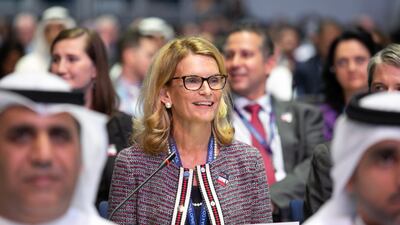The US won a power struggle with Russia over the future of the internet on Thursday, as an American candidate was elected to a key UN post overseeing the digital world.
The race for the International Telecommunication Union’s top job was seen by diplomats as a battle between the open internet favoured by the US and the censorship-driven approach taken by Russia and China.
Thursday’s vote, in which 139 votes went to US candidate Doreen Bogdan-Martin compared with 25 for Russia’s Rashid Ismailov, was also a test of Moscow's global standing during the war in Ukraine.
The UN body’s responsibilities include setting standards for digital communications and artificial intelligence, and promoting internet access and cyber security.
Experts said a Russian victory would have given it a platform to promote a more top-down model of internet management, including a more interventionist ITU. US officials had been eager to recapture the secretary general’s post after China’s Houlin Zhao held it for two terms.
“This is a critical moment for the ITU,” US Secretary of State Antony Blinken said in a message supporting Washington’s candidate.
A former acting CIA director, Michael Morell, said the obscure race would “determine whether the future of the internet will be free and open or characterised by censorship and government control”.
“The internet has remained largely open and free because of deliberate policy choices by the United States, our allies and multilateral standard-setting bodies that value free speech. Our adversaries are eager to dismantle this model,” Mr Morrell wrote in the Washington Post.
“If we cede this leadership and hand the keys to the internet to Vladimir Putin and Xi Jinping, we risk jeopardising our economic and national security as well as freedom across the globe.”
Ms Bogdan-Martin was backed by US allies including fellow UN Security Council members Britain and France. The EU's top diplomat Josep Borrell called the result a vote of confidence in an open internet.
US President Joe Biden, who personally endorsed Ms Bogdan-Martin's candidacy this month, marshalled 60 countries in April behind a declaration committing to a “global internet that advances the free flow of information”.

By contrast, a joint Russia-China statement last year committed to “preserving the sovereign right of states to regulate the national segment of the internet”, taken as a reference to domestic censorship.
The first woman to lead the ITU since it was founded in 1865 to oversee telegraph lines, Ms Bogdan-Martin said she was “immensely proud” to have broken a glass ceiling.
“I hope this result inspires women and girls everywhere to dream big and make those dreams a reality,” she said.
Previously an US commerce official and the head of an ITU development bureau, Ms Bogdan-Martin will take up the post on January 1.
The Information Technology and Innovation Foundation, a US think tank, said the result showed an international interest in an internet that “empowers individuals rather than becoming a tool for authoritarian regimes”.
“The victory of Bogdan-Martin’s vision, rather than that of her Russian opponent, will likely result in standards and policies that benefit countries, consumers, and commercial entities around the world,” it said.


